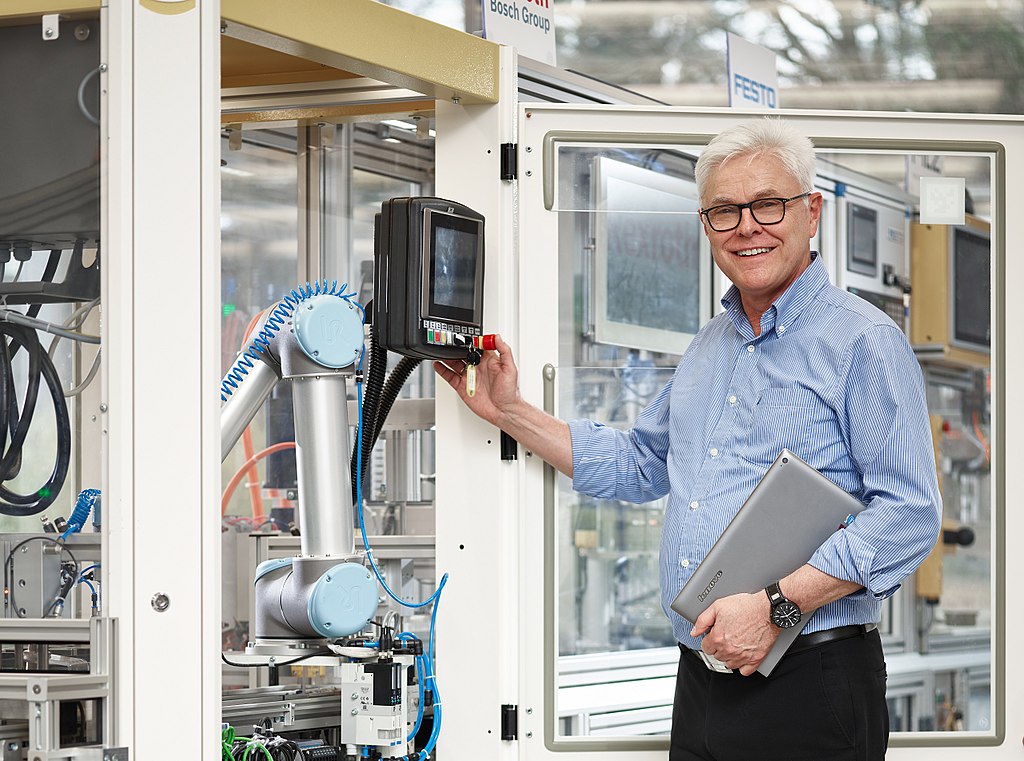How do we staff the factories of the future by closing the education gap?
Last Friday, I attended the IIoT World Tour in San Francisco hosted by the Industrial Internet Consortium. I got a chance to speak with Professor Detlef Zühlke who was most recently the Director of the Research Department for “Innovative Factory Systems” at the German Research Centre for Artificial Intelligence from 2009 to May 31, 2017. He was one of the founders of the Technologie-Initiative SmartFactory KL e.V. which was founded in 2005 as a non-profit association as a network of industrial and research partners who jointly carry out projects regarding the factory of the future. He has been one of the key global proponents and educators for Industry 4.0 and in 2016 he was named as one of the Top 50 Innovators of Digital Transformation by Smart Industry Magazine.

In our casual conversation, Professor Zühlke shared insight that contradicted the rhetoric around advanced automation and Industry 4.0 that it is eliminating jobs. While he didn’t rule this out in the future, he described a different situation today. The current refrain that he is hearing from industry colleagues around the world is that they simply can’t find enough people to operate new, more complicated machines.
Professor Zühlke then shared what Germany is doing to address this challenge. He told me that traditionally, Germany had three distinct educational paths post high school. The level 1 universities focused much like they do in the US on theory and really aim to train the next generation of professors and researchers. The level 2 schools focused on more practical careers, educating white collar workers and managers to drive business in a wide variety of fields. Beyond this, people not interested in or not qualified to attend a university would go to vocational schools. These schools provided the education for physical jobs – from car mechanics to computer technicians.
This system, while strong, resulted in many people falling through the cracks, especially those late bloomers who might not have been ready to pursue a degree at the end of high school. What he told me is that over the last several years, level 3 colleges are emerging with the support of the government, unions, and the private sector that allow blue collar or industrial workers to pursue a degree in their profession while working at their company. An example might be the equivalent of a 4 year Bachelor’s degree in Advanced Metalworking. Employees who pursue this type of education work reduced hours so they can attend school and, in return, they get a small stipend from the government to make ends meet. This system is filling the gap for industrial workers with advanced skillsets.
In our work with customers at Parsable, we frequently hear the same story. Western governments, like the US, seem to be wrestling with how to make manufacturing great again despite proven solutions being demonstrated in Germany and by advanced manufacturers making traction around the word. At Parsable we offer a very practical and immediate approach to help companies port the knowledge of their exiting Baby Boomers and Gen Xers to Millennials. To instantly modernize a workplace to make it vastly more efficient as well as appealing to “digitally native” Millennials, our mobile Connected Worker® by Parsable brings advanced procedures to workers to ensure that they know how to do even the most complex jobs. We effectively provide a platform that can serve up stretch goals and the career growth that young workers crave, while ensuring that critical work is performed correctly. This is served up in a format and through a platform and devices Millennials are used working with. Further, workers can ask for help through collaboration, so that answers to questions requiring more expertise are resolved quickly.
We’d like to show you how we can help you improve results of as well as the attractiveness of the work in your factories so you can quickly close the labor gap that some many companies we work with are experiencing. There certainly unique ways like Parsable to staff for your growth and innovation without having to wait for the wheels of government.






